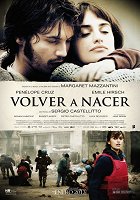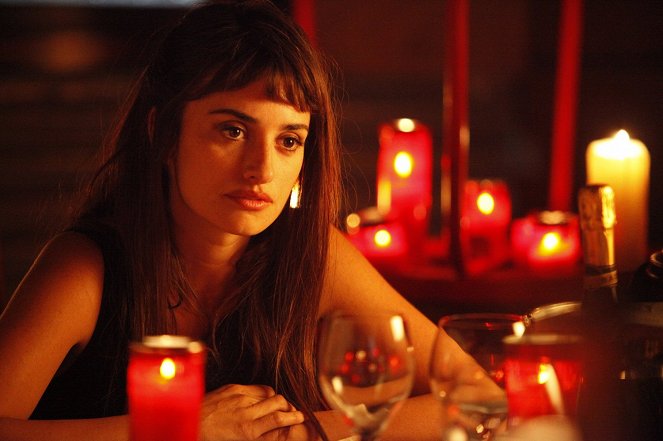Regie:
Sergio CastellittoKamera:
Gianfilippo CorticelliBesetzung:
Penélope Cruz, Emile Hirsch, Jane Birkin, Mira Furlan, Adnan Haskovic, Saadet Aksoy, Pietro Castellitto, Branko Djuric, Sergio Castellitto (mehr)Inhalte(1)
Gemma visits Sarajevo with her son, Pietro. 16 years earlier, they escaped the city where Pietro's father Diego died. As she tries to repair her difficult relationship with Pietro, she also confronts her past. Gemma first met and fell in love with Diego in Sarajevo. They desperately wanted children but she could not conceive. Amidst the siege of 1992, they found a possible surrogate, and Gemma pushed her into Diego's arms, only to be overwhelmed by guilt and jealousy. Now, a revelation awaits her – one that will force her to face the full extent of her loss, the true horror of war and the redemptive power of love. (Wild Bunch Distribution)
(mehr)Videos (4)
Kritiken (6)
In short: undercooked Europudding with all of the defining hallmarks of midcult. And now for the long version: That the film takes care of its outward appearance cannot be denied. Penelope Cruz is beautiful, war is beautiful, dying is beautiful. The aestheticisation of the unpleasant and the ugly keeps our attention on the surface, where any emotion can be much more easily manipulated (we are not moved by the causes, but by the effects, which can be easily “resolved” in the film and we can thus walk out of the cinema with the good feeling that the questions raised were answered). The layering of painless images and phrases as if copied from spiritual handbooks and rock-ballad lyrics is not initially aimed at any timeless goal. For the protagonists, the outside world comes into existence only after the potential for relationship problems has been exhausted. Major events serve only to (dramaturgically) spur small events, adding gravity to the shallow family melodrama. The inorganic inclusion of the Balkan conflict in the story gives rise to the false impression that it’s about more than just who conceived a child with whom. ___ The defining of a woman exclusively through her status as a mother is only one of the many stereotypes around which the story was constructed. If a woman is childless, she is irrelevant to the narrative. No role other than being a mother exists for her. In this context, infertility becomes a problem of global significance. ___ Twice Born presents a utopian model of a world in which nationality and racial and religious differences are set aside in favour of the idea of helping our fellow man. (If we read against the grain, it is a story about how the capitalist world pimped out the Balkan countries and then took away their hope for a better future.) ___ People mainly are not bad; what’s bad is that which goes beyond them, namely war and politics, concepts so generalised by the film that they become hollow. The bad situations are those that have caused trauma to the protagonists and made self-realisation and finding their own identity difficult for them (identity crisis is the film’s most important theme, though it is unfortunately also the most poorly developed). The abstract category of evil is represented by others, specifically the unnamed, who are unbound to a particular historical period (though probably coming from the Wild East rather than from the always helpful West). Thanks to that, the film relieves us of our guilt and gives us a pleasant feeling of how good we actually have it. ___ I respect the fact that kitsch is necessary. However, it is not necessary to uncritically receive and accept a banal view of the world, which in reality has many more colours and flavours. 50%
()
Sarajevo and its surroundings have never been so cool and used from a film perspective. When you watch Twice Born, you will notice that Sergio Castellitto filmed it with enthusiasm and passion. He wanted to put everything into this story. From strong emotions to pastel shots of the best local beaches. But that only works halfway, though the beginning is direct and gripping, unfortunately, it starts to stutter in the middle. Things slow down, more characters appear with their entanglements, and everyone, including the screenwriter, gets involved in it. The result, therefore, is somewhat average, but it's a pity. There’s a lot of European feeling, and that's good. Plus, thumbs up for the linguistic authenticity of the project and Penelope Cruz's fantastic performance.
()
A strong and emotionally intense drama that deserved far more attention than it ultimately received. A rejuvenated Emile Hirsch is a great complement to the timeless Penelope Cruz, and Sergio Castellitto's nostalgic approach turns this story into an immortal narrative. Perhaps some lines in the final catharsis blend a bit too conveniently, but when faced with the melancholic and oppressive theme of war, I don't even want to dwell on such criticism. 90%
()
Extreme chauvinistic drivel that muddles its thoroughly horrifically moronic Almodovar plot for two hours and puts it in a Yugoslavian war triple-wrapper to give it some value. Even formally it hurts, because the scenes don't build on each other, there was clearly more cutting than filming, I would have loved to see the characters loaded into a vat of acid one by one, and by the end the more the film played on my emotions the more I wondered what I was going to have for breakfast tomorrow. I think what amused me the most was that whenever the film didn't feel like itself, it pulled out some of the characters’ boobs so the viewer wouldn't dwell too much on further development.
()
I had initially thought that the gorgeous Penélope Cruz and the Italian film making craft would come up with a better movie. But it’s a completely botched romantic drama that profits off scenes filmed in beautiful Sarajevo. The story is divided into two parts, the past and the present. I liked the past better, it was more interesting, but I feel like it’s only made the movie inconguous.
()



Werbung